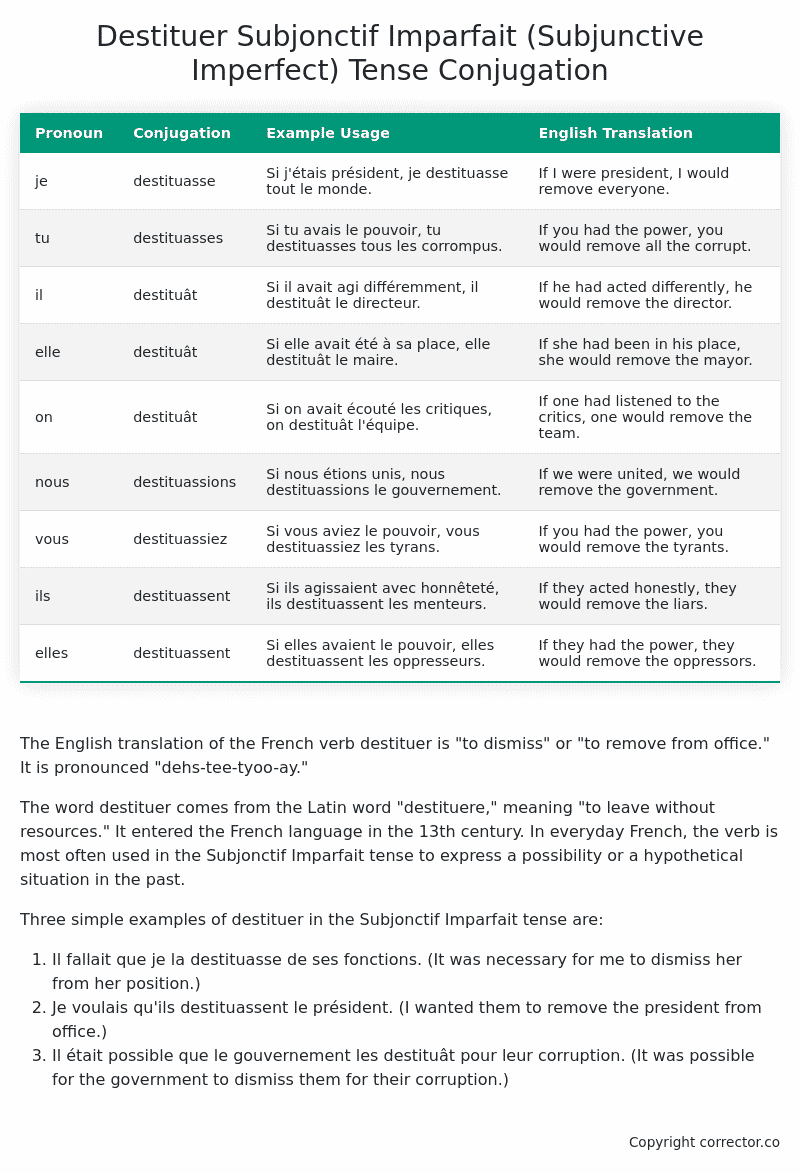Subjonctif Imparfait (Subjunctive Imperfect) Tense Conjugation of the French Verb destituer
Introduction to the verb destituer
The English translation of the French verb destituer is “to dismiss” or “to remove from office.” It is pronounced “dehs-tee-tyoo-ay.”
The word destituer comes from the Latin word “destituere,” meaning “to leave without resources.” It entered the French language in the 13th century. In everyday French, the verb is most often used in the Subjonctif Imparfait tense to express a possibility or a hypothetical situation in the past.
Three simple examples of destituer in the Subjonctif Imparfait tense are:
- Il fallait que je la destituasse de ses fonctions. (It was necessary for me to dismiss her from her position.)
- Je voulais qu’ils destituassent le président. (I wanted them to remove the president from office.)
- Il était possible que le gouvernement les destituât pour leur corruption. (It was possible for the government to dismiss them for their corruption.)
Table of the Subjonctif Imparfait (Subjunctive Imperfect) Tense Conjugation of destituer
| Pronoun | Conjugation | Example Usage | English Translation |
|---|---|---|---|
| je | destituasse | Si j’étais président, je destituasse tout le monde. | If I were president, I would remove everyone. |
| tu | destituasses | Si tu avais le pouvoir, tu destituasses tous les corrompus. | If you had the power, you would remove all the corrupt. |
| il | destituât | Si il avait agi différemment, il destituât le directeur. | If he had acted differently, he would remove the director. |
| elle | destituât | Si elle avait été à sa place, elle destituât le maire. | If she had been in his place, she would remove the mayor. |
| on | destituât | Si on avait écouté les critiques, on destituât l’équipe. | If one had listened to the critics, one would remove the team. |
| nous | destituassions | Si nous étions unis, nous destituassions le gouvernement. | If we were united, we would remove the government. |
| vous | destituassiez | Si vous aviez le pouvoir, vous destituassiez les tyrans. | If you had the power, you would remove the tyrants. |
| ils | destituassent | Si ils agissaient avec honnêteté, ils destituassent les menteurs. | If they acted honestly, they would remove the liars. |
| elles | destituassent | Si elles avaient le pouvoir, elles destituassent les oppresseurs. | If they had the power, they would remove the oppressors. |
Other Conjugations for Destituer.
Le Present (Present Tense) Conjugation of the French Verb destituer
Imparfait (Imperfect) Tense Conjugation of the French Verb destituer
Passé Simple (Simple Past) Tense Conjugation of the French Verb destituer
Passé Composé (Present Perfect) Tense Conjugation of the French Verb destituer
Futur Simple (Simple Future) Tense Conjugation of the French Verb destituer
Futur Proche (Near Future) Tense Conjugation of the French Verb destituer
Plus-que-parfait (Pluperfect) Tense Conjugation of the French Verb destituer
Passé Antérieur (Past Anterior) Tense Conjugation of the French Verb destituer
Futur Antérieur (Future Anterior) Tense Conjugation of the French Verb destituer
Subjonctif Présent (Subjunctive Present) Tense Conjugation of the French Verb destituer
Subjonctif Passé (Subjunctive Past) Tense Conjugation of the French Verb destituer
Subjonctif Imparfait (Subjunctive Imperfect) Tense Conjugation of the French Verb destituer (this article)
Subjonctif Plus-que-parfait (Subjunctive Pluperfect) Tense Conjugation of the French Verb destituer
Conditionnel Présent (Conditional Present) Tense Conjugation of the French Verb destituer
Conditionnel Passé (Conditional Past) Tense Conjugation of the French Verb destituer
L’impératif Présent (Imperative Present) Tense Conjugation of the French Verb destituer
L’infinitif Présent (Infinitive Present) Tense Conjugation of the French Verb destituer
Struggling with French verbs or the language in general? Why not use our free French Grammar Checker – no registration required!
Get a FREE Download Study Sheet of this Conjugation 🔥
Simply right click the image below, click “save image” and get your free reference for the destituer Subjonctif Imparfait tense conjugation!

Destituer – About the French Subjonctif Imparfait (Subjunctive Imperfect) Tense
Formation
Common Everyday Usage Patterns
Interactions with Other Tenses
Subjonctif Présent
Indicatif Passé Composé
Conditional
Conditional Perfect
Summary
I hope you enjoyed this article on the verb destituer. Still in a learning mood? Check out another TOTALLY random French verb conjugation!


